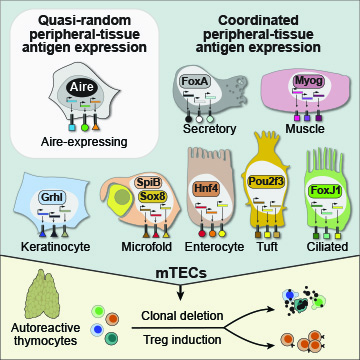Thymic mimetic cells: tolerogenic masqueraders
Medullary thymic epithelial cells (mTECs), a small subset of thymic stromal cells, ectopically express thousands of genes encoding peripheral-tissue antigens (PTAs), thereby driving deletion of self-reactive thymocytes or their diversion to the regulatory T cell lineage. Failure of PTA expression results in multiorgan autoimmunity, as occurs in APECED, the autoimmune disease caused by a deficiency of the transcription factor (TF), Aire. By assaying chromatin accessibility in individual mTECs, we found signatures of lineage-defining TFs for skin, lung, liver and intestinal cells — including Grhl, FoxA, FoxJ1, Hnf4, SpiB and Sox8 — in distinct mTEC subtypes. Population-level and single-cell transcriptomics showed that these subtypes, which we collectively term mimetic cells, express PTAs in a biologically logical fashion, mimicking extra-thymic cell types while maintaining mTEC identity. Thymus-intrinsic deletion of the lineage-defining TFs, for example SpiB and Sox8, ablates their corresponding mimetic mTEC, the thymic microfold cell, and impairs microfold-associated PTA expression within the thymic epithelium. Expression of a model neoantigen in each of three distinct types of mimetic cells suffices to induce cognate T-cell tolerance, clonally deleting antigen-specific effector T cells while preserving antigen-specific regulatory T cells. More recently, we have characterized analogous thymic mimetic cells in human mTECs from pediatric patients undergoing cardiac surgery. In brief, then, mTECs co-opt lineage-defining TFs to generate thymic mimetic cells, which drive PTA expression and self-tolerance. As with Aire and APECED, defects in the thymic action of lineage-defining TFs may help explain syndromic manifestations of autoimmunity.

Conférencier(ère)s
Diane MATHIS, Harvard Medical School
États-Unis
